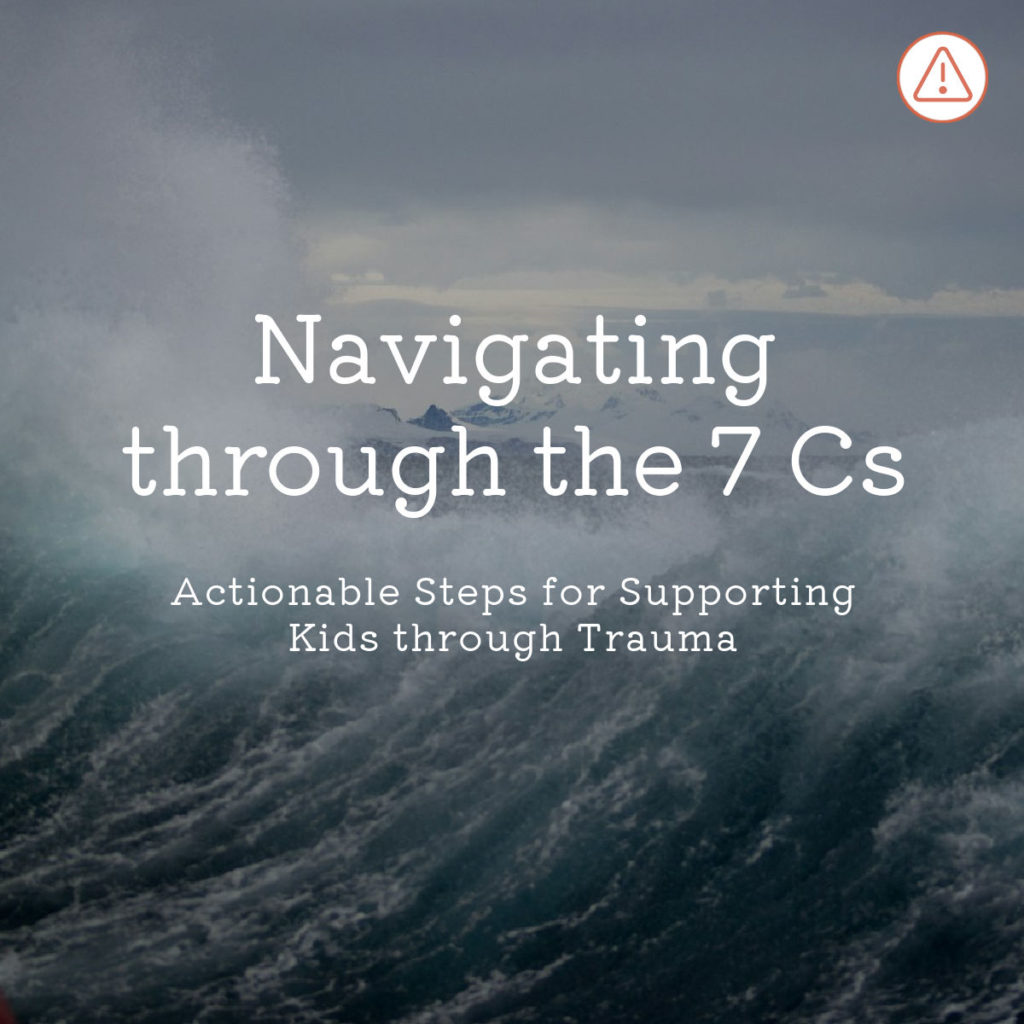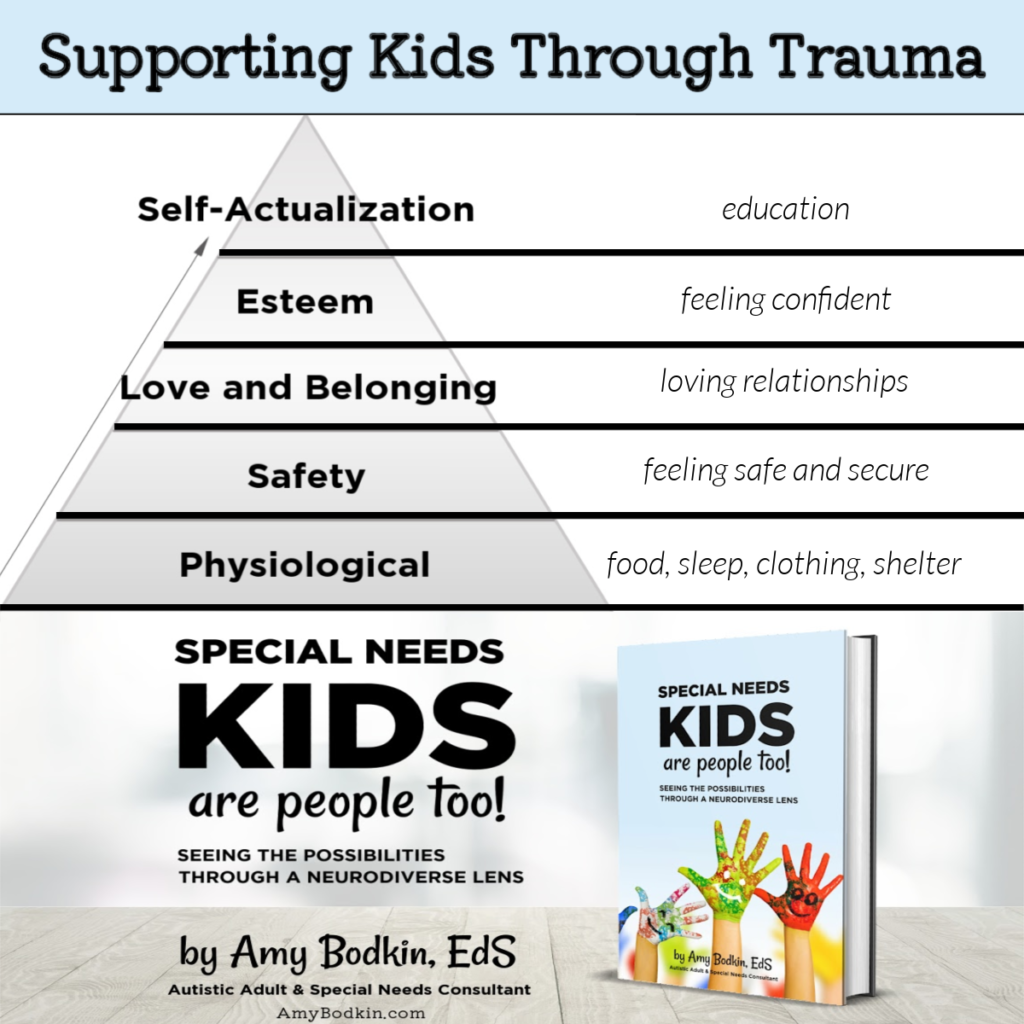Help Series: Navigating through the 7 C’s – Actionable Steps for Supporting Kids through Trauma

I don’t know what kind of storm you are going through, and I cannot know how that feels or what feels right as you move through it. But I do know how hard it can be because I have lived through my own share of storms, both figuratively and literally, and each has contributed to my 7 C’s for supporting children through trauma.
- Comfort
- Community
- Conform to Preferences
- Cut Demands
- Change expectations
- Care for ourselves
- Consistent acknowledgement
Comfort
When going through difficult situations, the stress hormone, cortisol, increases dramatically to provide your body with everything it needs in a “red alert” situation. But it also causes the side effects of muscle tension, sleeping difficulties, headaches, digestive problems, anxiety, and depression, which most of us are probably all too familiar with. However, there are some things we can do to keep these side effects from making a hard situation even harder. We can inhibit the release of cortisol by increasing our oxytocin levels, often described as the “stress-busting hormone.” But, how do we increase oxytocin? It turns out it is really quite simple. We are looking for things that make life beautiful – things like music, hugs, laughter, talking with a friend, exercising, etc. Your usual comforts may not be available, but there is always beauty to be found if you look for it.
Personal Example: When I was a young child, we had an ice storm and lost power for a week. We went through our firewood quickly and had to defrost frozen branches to heat and feed ourselves. What I remember most though are playing games with my family by lantern light and listening to my mom read Dealing with Dragons (book 1 of The Enchanted Forest Chronicles by Patricia C. Wrede). We were given the opportunity to just live life – to embrace all the available things that brought us comfort.
Community
The hardest thing about going through a difficult situation is when you feel like you must carry that burden alone. We are social creatures, even the most introverted of us, and we need people that we can share the pleasures and burdens of life with.
Dr. Michael Platt says our brains are wired to connect, literally.
“Structures in the brain, collectively described as the ‘social brain network,’ work to manage our moment-to-moment interactions with other people … in individuals who have more friends, the social brain network is larger.”
He also states that
“People who have more friends or deeper friendships live longer, healthier, happier lives, and they make more money. And the flip side is true: Chronic loneliness is more devastating to your health and well-being than smoking a pack of cigarettes a day.”
Personal Example: In the wake of September 11th, we all sought out our fellow Americans whether we knew them or not. We cried with complete strangers, held hands with people we had never met, and gave of our time and blood to help people we would never meet. We needed people to share our grief, and who could better understand that grief than fellow Americans? Different people needed different kinds of support, but we all needed connection and community.
Conform to Preferences
Each person experiences difficult situations in a completely different way due to their own genetic makeup, development, and past experiences. These differences can cause our sensory pathways to perceive events differently and our brains to interpret the information we are taking in differently. What causes one person comfort can cause another person trauma. In order to help decrease a child’s fight, flight, fawn, or freeze response, we have to avoid things that will increase that response. It does not matter whether or not the fear is realistic. If it feels real to that child, it can cause a physiological response. And because children, especially, are not always capable of fully processing traumatic events immediately, it is important to conform to the child’s preferences until they feel more secure.
Personal Example: I have had the privilege to be present with multiple friends through the death of their mothers. The five-year-old flower girl at my wedding lost her mother a month before my wedding. I knew how to support her because my best friend when I was little had also lost their mother when she was just five years old. What I learned from being present with my friends through that experience was that children need space to be themselves and process in a way that works for them. You must follow their lead.
Cutting Demands
You may have heard the maxim popular in homeschooling circles to “keep cutting back until there is peace in your home.” We often become so success-oriented in our fast-paced, fast-food, modern world, that we often cannot tell when our bodies have had enough. It takes slowing things down and intentionally listening to how our bodies feel in order to find the elusive “Goldilocks Zone” in our demand load. Once you know where that zone is, it is important to respect that boundary.
Those with autoimmune conditions often refer to the Spoon Theory, the idea that you only have so many spoons to use in a day and need to be careful how you choose to use them. When demands become completely intolerable, it is sometimes referred to as PDA, or Protective Demand Avoidance, because it’s truly all about protection from overload.
Personal Example: When Hurricane Katrina came through, we learned very quickly that, while having a rhythm to life that feels comfortable is important, actual teaching and learning need to take a back seat. It was my training in crisis and trauma work during Hurricane Katrina that influenced my later consulting work and my book Special Needs Kids Are People, Too! I learned just how important it is to prioritize needs in a certain order based on Maslow’s Hierarchy of Needs because it helps prepare us for future learning.
Change Expectations
When your circumstances don’t match everyone else’s, you can’t live life like everyone else does with the same amount of effort. The rules and expectations that people so commonly revere as gospel may not even work for you at all. You may even have to do things the complete opposite of the current parenting wisdom and that is okay! The current parenting research is not based on your specific set of circumstances. It is based on the average set of circumstances, so it might not apply to your situation at all.
So long as you are guided by love and respect for your child as an individual, combined with what knowledge you are able to glean, it will more than likely be alright. Love covers a multitude of mistakes and less than ideal circumstances.
Personal Example: I, like many Autistic people, have a genetic connective tissue disease called Ehlers-Danlos Syndrome. My body does not work like everyone else’s, and I have had to make some unusual adaptations to compensate. When our children were young, they spent a lot more time on electronics than they would have otherwise because I was homebound (and sometimes bedbound). I also learned to simplify laundry down to a “dirty basket” and a “clean basket,” instead of folding clothes.
Care for Ourselves
People always tell you to put your own oxygen mask on first, and it always feels so out of touch because it is usually said by someone who has a lot more resources to pull from than you do. But it is true. We might be able to still manage to take care of our children by borrowing from tomorrow, but we will set a very bad example for our children.
When we don’t take care of ourselves, it says, “I’m not worthy.” And when our children watch us go day-after-day without providing for our own needs, they learn that is how you “adult.” We are setting the tone for our children, not just about how to cope with today, but also how to cope in the future as adults themselves. We are the adults in the situation, and we get to set the tone! Prioritize putting your own mask on first, even if all you can manage is a couple of minutes to breathe and listen.
Personal Example: During COVID, we watched people panic and try to buy up all of the toilet paper and hand sanitizer they could find. And in the same breath, we told children to keep calm and carry on with online schooling. The fallout from that response was record numbers of mental health issues, especially among teenagers. Taking care of ourselves does not have to be grand. It can be as simple as a few minutes of meditating or taking time to fully appreciate the sensory experiences of necessary daily activities.
Consistent Acknowledgement
One of the worst things that you can do to a person going through a difficult situation is to gaslight them by denying the validity of their feelings and perceptions. During hard times, we need to increase our feelings of security and confidence. Gaslighting steals that security and confidence by making the person doubt themselves.
But what does it look like to consistently acknowledge someone’s feelings? It means listening, acknowledging that their feelings are valid, and expressing your love for them and that what they are going through is hard and not fair. You don’t have to fix their problems. Some challenges can’t be fixed. You just have to get through them. But it is a lot easier to get through them when you don’t feel invisible to the compassion of others.
Personal Example: The attack on Israel on October 7th hit our family hard. Not only did our friends have friends and family who were murdered, taken hostage, or injured, but we also experienced increased anti-semitism in response to the attack. The most painful part about the whole thing was feeling that no one cared or was willing to speak out against the hate we experienced. Sitting with people and acknowledging their pain can make such a difference.
Supporting Kids (and Ourselves) through Trauma
If you look carefully, you can find each of these 7 C’s in Maslow’s Hierarchy of Needs and see how each one is important in preparing us to reach a point where learning can happen!
These are things we all need as human beings. Sometimes we just need to be more conscientious of making sure those needs are being met, especially when we are distracted and overwhelmed.
Help Series
And remember, Special Needs Kids are People Too!


0 Comments for “Help Series: Navigating through the 7 C’s – Actionable Steps for Supporting Kids through Trauma”